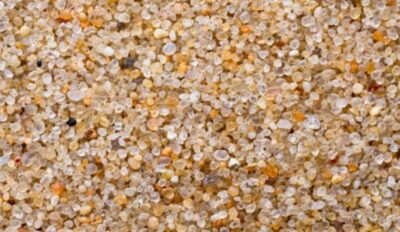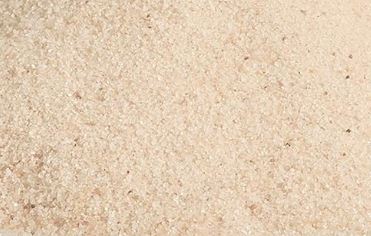Quartz Sand vs. Silica Sand: What’s the Difference?

Ever wondered about the differences between quartz sand and silica sand? They might look similar at first glance, but they have some key differences that make them unique. Let’s dive into this sandy topic and clear up any confusion you might have!
Quartz Sand vs. Silica Sand
Quartz Sand

Quartz sand stands as the natural, organic option in terms of sand options. It forms when quartz-rich rocks break apart over millions of years – think mountains crumbling into tiny pieces – producing quartz sand as its result.
Quartz is famed for being durable and resistant to chemical weathering effects; making it one of the tougher members of its family of sand types.
Silica Sand

Silica sand may sound similar, but it has its own character. Though composed primarily of silicon dioxide, silica sand has long been recognized for industrial applications – its versatility compared to regular beach sand makes it perfect. Think of silica sand like Swiss Army knife of sands; ready and eager for use whenever needed!
Chemical Composition
Let’s get a bit nerdy for a moment: Both quartz and silica sand contain silicon dioxide (SiO2). But the devil lies in the details:
Quartz sand contains almost pure SiO2, the equivalent to being an A student without extracurricular commitments.
Silica sand contains more minerals than just SiO2, like having an all-around student who excels at everything.
These impurities can significantly impact the sand’s properties and uses. A little iron here, a touch of feldspar there, and suddenly you’ve got a whole different ball game!
Particle Characteristics
Size matters in the sand world, and so does shape. Quartz sand particles tend to be more angular and irregular, like pieces of a broken mirror.
Silica sand particles, on the other hand, are often more rounded, like tiny marbles. This difference in shape affects how the sand behaves in various applications, from concrete mixing to glass making.
Hardness and Durability
Quartz and silica sand are hardy materials. Both rank around 7 on Mohs’ scale of mineral hardness – that means harder than steel nail! With such extreme hardiness comes superior wear resistance that’s great for applications where wear resistance is vital – like having your very own industrial bodyguard!
Color Variations
Quartz sand ranges in hue from transparent to milky white while silica sand may vary between white, tan and even pink hues depending on its mineral makeup – nature’s own palette!
Extraction and Processing
Mining sand requires more than simply scooping it off of beaches – it involves complex processes including open-pit mining, dredging and underground mining.
Once extracted, extracted material often undergoes rigorous cleaning and sorting processes – it’s like sending toughest grains through boot camp!
Industrial Applications: A Comparison
Both types of sand have their specialties. Quartz sand is a star in the construction industry, while silica sand shines in glassmaking and metal casting. They’re like specialized tools in a craftsman’s toolkit – each has its perfect job.
Cost Factors
The price of sand can vary wildly depending on quality, purity, and location. It’s like the real estate market – location, location, location! Generally, high-purity silica sand commands a premium due to its specialized applications.
Health and Safety Concerns
Working with sand can be hazardous to one’s health if inhaled for extended periods, so workers in industries using such substances need to use appropriate protective gear as part of the job – think of it like sunscreen for your lungs; better safe than sorry!
Quality Control and Testing
Sand goes through more tests than a student during finals week. From sieve analysis to chemical composition tests, every grain is scrutinized to ensure it meets industry standards.
Global Market Trends
Quartz and silica sand is enjoying unprecedented demand due to increased construction and manufacturing sectors; seemingly running the global economy! It seems these tiny grains may even be doing this!
Future Outlook
With natural sand resources dwindling rapidly, sustainable alternatives and more efficient extraction methods have become ever more crucial to maintaining their supply. By learning new tricks for this ancient resource we’re finding new ways to responsibly exploit it – like teaching an old dog new tricks!
FAQs
Can I use quartz sand instead of silica sand for my home aquarium?
Although both materials can work for aquariums, silica sand may be preferred due to its round particles which are less likely to harm fish.
Are the prices of silica and quartz sand comparable?
Due to their specific applications and processing needs, high-purity silica sand tends to be more costly.
Can I tell the difference between quartz and silica sand by simply looking?
Visual identification may not always suffice; laboratory testing should usually be employed in order to ascertain their exact composition and properties.
Does one type of sand extraction offer greater environmental advantages than another?
Environmental impact depends heavily upon mining practices rather than type of sand used, with responsible mining techniques crucial in both cases.
Could quartz sand be used in glassmaking, similar to silica sand?
Quartz sand may be suitable for some glass applications; however, high-purity silica sand is typically preferred due to its consistency and purity in producing higher quality glass products.
Conclusion
Quartz and silica sand may seem similar at first glance, but their differences become obvious upon closer examination. From their formation to usage and beyond, these sandy siblings each play their own crucial role in our world – so next time you visit a beach or construction site take time out to appreciate what may just be an unexpected source of support!

